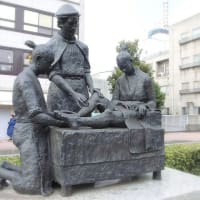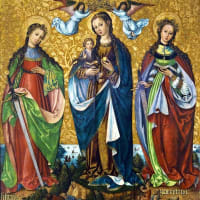3. Process Theology and the Logic of Topos
It is remarkable that Whitehead calls his metaphysics "the philosophy of organism"but not "process theology" The reason why the successors of Whitehead have been called "process theologians" is that the ultimate purpose of PR is to elucidate the relationship of the world to God in history. It may be admitted that one of the main chatacteristics of this cosmological essay is the concept of dynamic process as actuality which subordinates the static (objective) beings as potentials, but we must remember that the fundamental theme of the philosophy of organism is to "elucidate the paradox of the solidarity or the connectedness of things:--the many things, the one world without and within".(21) Process theologians seem to have overlooked the importance of this paradox, i.e. the connectedness of actual entities which are mutually immanent in each other qua genuine individuals . What the philosophy of organism seek to preserve is "the discovery that the, process, or concrescence, of any one actual entity involves the other actual entities among its components".(22)
The categoreal scheme of Whitehead's metaphysics was invented to develop " all those generic notions adequate f or the expression of any possible interconnection of things". (23) In order to elucidate the solidarity of the world, Whitehead introduced "the principle of relativity" as "the one general metaphysical character attaching to all entities, actual and non-actual, that every item of its universe is involved in each concrescence". (24) Whitehead stressed the philosophical significance of this principle as follows:(25)
The principle of universal relativity directly traverses Aristotle's dictum, "A substance is not present in a subject". In fact if we allow for degrees of relevance, and for negligible relevance, we must say that every actual entity is present in every other actual entity. The philosophy of organism is mainly devoted to the task of making clear the notion of "being present in another entity". This phrase is here borrowed from Aristotle; it is not a fortunate phrase, and in subsequent discussion it will be replaced by the term "objectification".
The concept of substance is often roughly characterized as that which is always an subject, never a predicate(object). This definition is not adequate because it does not articulate two different aspects in the definiens of substance between which Aristotle carefully distinguishes in his theory of Categories. (26) One is the aspect of grammatical predicat ion which is schematized as "to be asserted of a subject (kath' hypokeimenou legesthai), the other is the ontological aspect of immanence which is schematized as "to be present in a subject(en hypokeimenoi einai)". The primary substance (say, Socrates) is defined as "that which is neither present in any subject nor asserted of any subject, whereas the secondary substance (say, animal) is not in any subject but can be asserted of some subject(say dog)". The concept of substance, whether primary or secondary, certainly contains an element of mutual externality or exclusiveness among substances , and this kind o f disconnectedness is the target of Whitehead's criticism against the ontological tradition since Aristotle.
Whitehead replaces the Aristotelian phrase of "being present in a subject" by "objectification" . In this context , the object is always a universal element inherent in a subject and the "objective reality(realitas objectiva)", does not mean the reality of a thing which exists independently of any subject as it usually means in modern philosophy. Rather, it signifies the reality of other entities objectified for and immanent in an actual entity.
According to the principle of relativity, everything can function as an object, i.e. every being has "the potentiality for being an element in a real concrescence of many entities into one actualityt". (27) What makes an entity "actual" is its subjectivity in the process of concrescence and the actuality without subjectivity should be rejected as "vacuous" in Whitehead's system.(28) The subjectivity of an actual entity is always self-transcending; it gives itself as one object among others to the universe through the transition from the subjective immediacy to the objective immortality. In order to signify this character of self-transcendence, Whitehead replaces the concept of mere subject by that of "subject-superject". The actual entity is to be conceived both as a subject presiding over its own immediacy of becoming, and as a superject exercising its function of objective immortality in other actual entities. (29)
The actual entity as a superject is a universal in the sense of its entering into the constitutions of other actual entities because it has become a "being" and it belongs to the nature of a "being" that it is a potential for every "becoming". (30) The actual entity in its own subjective immediacy is an individual occasion of experience in the sense that the same process of concrescence cannot happen twice on account of "the insistent particularity of things experienced and of the act of experiencing."(31) The unity of opposites such as the concept of an actual entity as a subject-superject and as an individual-universal is a necessary condition for understanding the solidarity of the universe.
According to Jorge Luis Nobo who has presented a new interpretation of the philosophy of organism, (32) the concept of the "receptacle" or "the extensive continuum" plays an ultimate role for the solidarity of the universe. Nobo distinguishes the metaphysical extensive continuum from the physical spatio- temporal continuum, and tries to demonstrate that the (metaphysical ) extensive contiuum and the eternal creativity are both sides of the same ultimate metaphysical coin. Extension and creativity will then be understood as distinguishable, but inseparable, aspects of "the one ultimate reality grounding the becoming, the being, and the interconnectedness of actual entities." (33)
There may be some objections to Nobo's interpretation of Whitehead, because Whitehead himself did not include the extensive continuum in the categoreal scheme in the first part of PR, but classified it as one of applications of the categoreal scheme. This fact may refute Nobo's thesis that the extensive continuum and creativity are both sides of the same ultimate reality. Nobo anticipates this criticism,(34) saying that the categorial scheme in the first part of PR should be considered neither as a final and accurate formulation of the metaphysical principles nor as the categories of the organic philosophy. I agree with Nobo that Whitehead's system has to be read in the making, but not to be read as a completed dead system, yet the fact remains that Whitehead himself did not include the extensive continuum in his categoreal scheme.
Apart from the problem of his faithfulness to the texts of PR, Nobo's reading of Whitehead is extremely interesting to us, for it will certainly provide the key for the mutual understanding between process theologians and the Nishida School.























